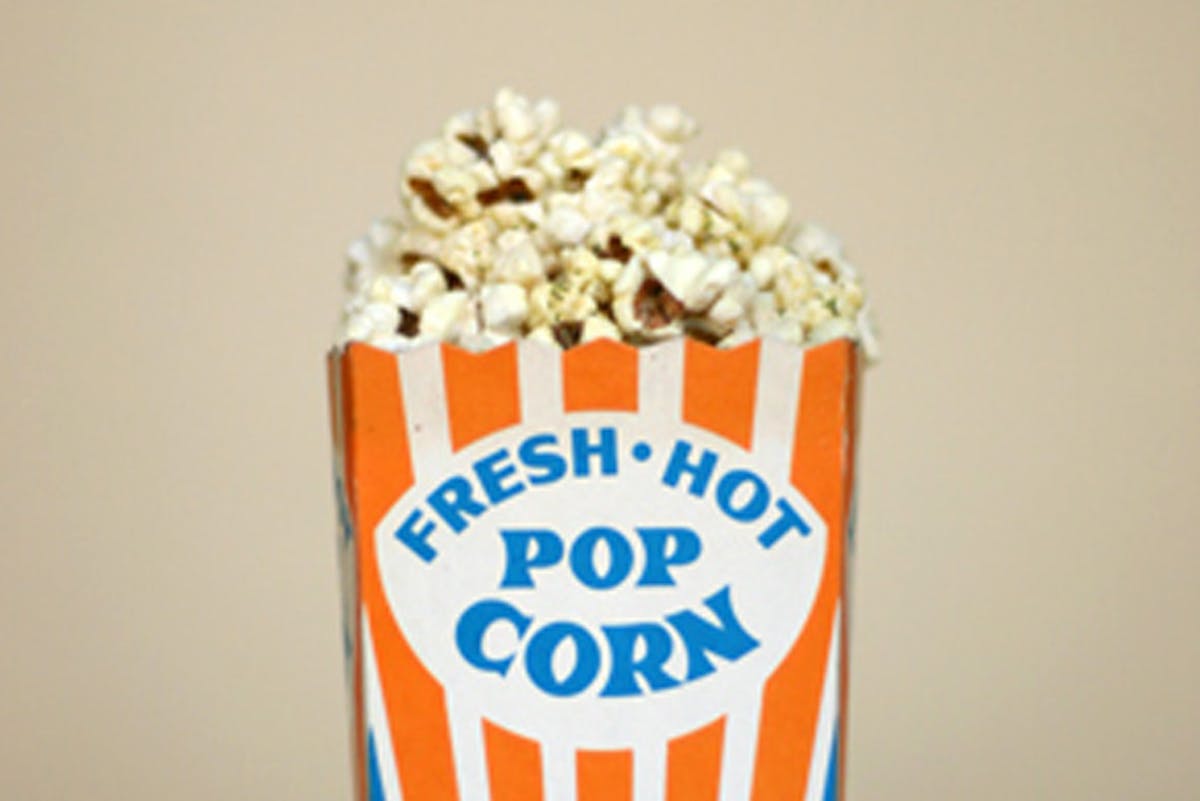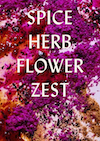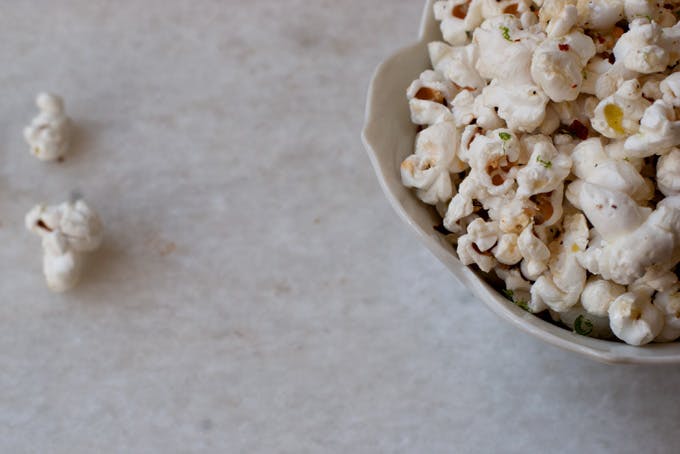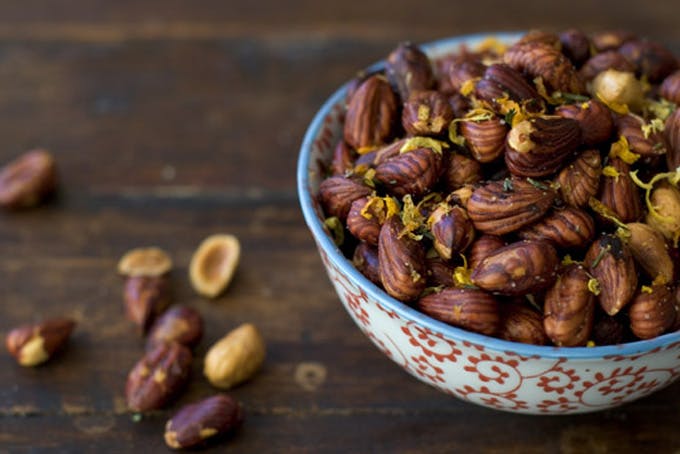Herbed Buttermilk Popcorn Recipe
The seasoning from this popcorn recipe hits you in waves - the smell of the dill, the tang of the buttermilk powder, a bit of kick from the onion and garlic powder. You'll never go back to the movie theatre variety.

I attended a sold-out screening of the Deborah Koons Garcia documentary the other night, "The Future of Food."
I remember being in my early twenties and being generally shocked when someone told me that it was standard practice to give dairy cows shots of a hormone that would dramatically increase their milk production. I remember thinking immediately that I didn't want to drink milk from those cows. There was a dairy farm up the street from my house growing up, Mr. Peake's dairy. My memory is a bit hazy, but I would guess Mr. Peake was about 85 years old at the time, and had about fifteen kid-friendly cows on eight acres. When Mr. Peake passed away the dairy farm was sold off in 1-acre, million-dollar plots that would eventually be turned into standard issue, Silicon Valley McMansions. I thought, generally speaking, that milk came from cows that lived like Mr. Peakes.
I also had a general idea about how crops were grown on farms. I thought that at the end of each season farmers collected seeds, saved them in little kraft colored packets, and then used them to grow crops the following year. Maybe certain plants were crossed with others to produce a sweeter fruit, or a heartier plant - but nothing like what is going on in agriculture today. Corn was corn. Tomato was tomato. Apples were apples, and they grew in every grandma's back yard.
The message The Future of Food delivers is important and chilling. The film builds a case through interviews with farmers and scientists, and through the use of contemporary and archival footage, that genetically engineered food (GMOs) could be jeopardizing food safety -- in turn, jeopardizing consumer health and well-being. This means the health of you, your family, your friends.
Genetically modified foods and ingredients are quietly making their way into many of your everyday foods - I read a statistic in Harold McGee's book recently that an estimated 75% of all processed foods now contain them. The fact of the matter is, that unless you are highly diligent, you are likely consuming GMOs daily. About 80 percent of the soy in the US is genetically engineered, a majority of the canola, about 40 percent of corn, and roughly half of Hawaiian Papaya. You aren't off the hook just because you don't eat much corn on the cob, or tofu kabobs. GMOs are in these crops and any products that are processed with these crops as ingredients -- for example: corn syrup, corn starch, soft drinks, or soy milk all may be made with genetically engineered base ingredients (unless labeled organic).
There is one fact in particular that I find most alarming in regards to the GMO issue - This is the first time in human history that scientists have broken down the natural barriers that prevent inter-species gene swapping. Prior to this you wouldn't see starfish genes crossing with pineapple genes for example. The consequences of introducing this technology to our environments and food supply are unknown. These snippets of DNA will now interact with each other in ways that are totally unpredictable. Because we are dealing with living organisms here, these strains will spread, multiply, and reproduce. The effects of genetically engineered crops are irreversible. Unintentional contamination of previously non-GMO crops, fields, and areas is already well documented. There are studies that have shown that many non-GMO fields have become contaminated with seeds and plants, and current methods of segregating GMO plants are failing.
Other alarming facets of genetically engineered crops:
-Documented increased herbicide use on GMO crops.
-Because GMO foods aren't labeled as such, you can't track or study cancers rates, allergies, or adverse reactions.
-No one is sure how the human body will react to GMOs over time, or on the developing bodies of children.
This is a heavy and controversial topic. Because it relates to food, health, and nutrition I encourage you to read up on it, and I will include some links at the bottom of the page for starters. Reading about GMOs over the past few years and now having much of that information reemphisized in Deborah Koons Garcia's film has reinforced the direction I was headed in terms of personal behavior and commitments. In addition to advocating the labeling of all GMO foods and products:
-I'm buying only organic groceries (very minimal exceptions). Organic food standards do not allow for GMOs. If it is organic, it is as safe a bet as you are going to get that you are eating non-GMO. It can be tough to eat organic at the local burrito shop or whatever, so we cook at home a lot. The money you save by eating at home often offsets the increased cost of buying organic.
-Buy your food from people you know and trust. Support your local farmers, producers, and farmers markets - talk to them about how their food/crops are produced. My local farmer's market here in San Francisco has one of my favorite programs each Saturday called "Meet the Producer"...a different farmer comes each week and talks about his or her crops, methods, challenges, philosophies, and passions. I've learned a lot from this program and try to attend as often as possible.
-Buy whole foods. If you are buying processed foods with lots of glossy packaging and really long ingredient lists you need to make a shift.
After the film screening there was a fiesty panel discussion led by Michael Pollan (Botany of Desire, UC Berkeley Journalism), flanked by Ignacio Chapela (microbiologist, UC Berkeley), Andrew Kimbrell (Center for Food Safety), and Koons Garcia. I'm not sure if anyone there was video-taping that panel, I think I saw a few cameras around - I would be great if someone would post it to the web.
Some links:
The Future of Food: Watch the movie and then send a copy to a friend.
Shopping List of Non-GMO Foods (click here)
The Sierra Club on genetic engineering (click here)
Book : Seeds of Deception(click here)Book : Fatal Harvest(click here)
The Center for Food Safety: (click here)
Slow Food USA: (click here)
Organic Consumers Association: (click here)
The food of the night was (appropriately) organic fresh-popped popcorn. Tasty. I've had a recipe for Herbed Buttermilk Popcorn sitting here on my desk for almost a year. I've just been waiting for the right time to try it, and it seems like this post might be the perfect tie-in. I have other books by the Corpening sisters, and this book is another beautifully designed addition to any new cooks collection.
The Herbed Buttermilk Popcorn is delicious and addictive. It is a great recipe because it isn't oily or too buttery -- not too salty either. The seasoning hits you in waves, the smell of the dill, the tang of the buttermilk powder, a bit of kick from the onion and garlic powder. Delicious. I recommend making a double batch or both the seasoning and the popcorn.
Herbed Buttermilk Popcorn Recipe
1 tablespoon powdered buttermilk
1 teaspoon garlic powder
1 teaspoon onion powder
1 teaspoon lemon pepper
1/2 teaspoon dried dill weed
1/2 teaspoon powdered chicken bouillon or kosher salt
1 tablespoon corn oil
1/3 cup popcorn kernals
2 tablespoons unsalted butter
Combine the buttermilk, garlic powder, onion powder, lemon pepper, dill weed, and chicken bouillon in a small bowl.
Heat the oil in a large saucepan over medium heat. Add the popcorn and cover with a lid (hs note: I leave a little crack in the lid to let a bit of hot air out and prevent condensation in the pot). Shake the pan frequently. Remove from the heat when the poppin subsides. Pour the popcorn into a bowl. Wipe the pan clean with a paper towel. Melt the butter in the pan. Pour the butter over the popcorn, tossing to distribute evenly. Sprinkle with the flavoring mixture and toss to coat.
Makes 8 cups; serves 4.
From Bride & Groom First and Forever Cookbook (Chronicle Books, 2003) - reprinted with permission




Comments are closed.
Apologies, comments are closed.
Comments
I tried this popped corn recipe. It’s really good, but I did make a couple tweaks and thought I’d share. The buttermilk gave it a tang, but it was this funky underlying flavor that I couldn’t put a finger on. I substituted it for 1 tablespoon grated parmesean and 1/2 teaspoon buttermilk powder. I adore this recipe with the change!
Great post Heidi! I was at the same screening.
While I think Sandy makes some salient points I don’t believe the Monsantos of the world have those priorities in mind–they are interested in corporate success–ie. money. Corporate social responsibility is seriously lacking within the Fortune 500. Returning shareholder value is THE primary objective–there’s no time or resources deadicated to focus on what’s right long term, much to my chagrin. Sigh.
I’ve read your website for a while, and always loved your photography, recipes, and writing. I wanted to comment today because (while I do agree with many of the things you have just said) I also think it’s important to remember that most subjects are not one-sided: There ARE real (now) and future potential benefits to the GM situation, and I believe it’s important not to shut your mind to the technology.
I think GM foods have a lot of potential if used correctly: to help grow crops where it is currently difficult to do so, to develop more nutritious strains, to reduce the use of pesticides (I especially like that one), larger crops with less land, etc. What I think is actually wrong with GM foods right now is the lack of stringent and extended testing (the lax FDA regulations on GM food is a little scary) and also a lack of education on the subject. I.E., Good farming practices often seem to go the the wayside with the “total solution” image GM crops give off, and the public is kept horribly in the dark about what they are eating (there really should be labeling) and what is really means. I think companies that work with GM food are arrogant and heavy-handed for the most part.
BUT I think, that with care and testing and thoughtfulness, there is definitely a place for GM crops in this world. Fear mongering on either side isn’t going to help that situation come about, however.
I recently read a good book on the subject that you might want to add to your list of resources: “Food, Inc.” by Peter Pringle. I really enjoyed it, and the author tried to be fairly objective. I’d recommend it.
Anyway, keep up the good work, and I’ll keep reading it! ; )
What a great post, Heidi! Thank you for highlighting this film for us and for sharing your perspective on how our food is being “engineered” and processed today. Interesting and informative. Also, I’m eager to try the popcorn recipe; it sounds really good.
Comments are closed.
Apologies, comments are closed.
More Recipes
Weekly recipes and inspirations.
Popular Ingredients